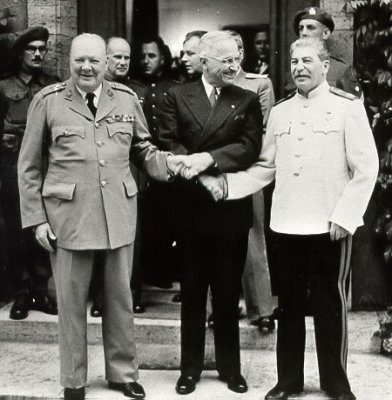Difference between revisions of "Potsdam Conference and the future of Germany"
(→July 17- August 2, 1945) |
|||
| (One intermediate revision by one other user not shown) | |||
| Line 3: | Line 3: | ||
[[File:20thJuly.jpg|400px|thumbnail|left]] | [[File:20thJuly.jpg|400px|thumbnail|left]] | ||
| − | The three newly victorious powers meet at Potsdam to discuss the future of the German state. Building upon the agreements made at Yalta from February 4th | + | The three newly victorious powers meet at Potsdam to discuss the future of the German state. Building upon the agreements made at Yalta from February 4th th 11th, Stalin, Churchill and Roosevelt, 'the Big Three', agree on five prominent aims of the Allied occupation of Germany: demilitarization, denazification, democratisation, decentralisation and decartelisation. The measures taken in order to meet these aims include the division of Germany and Austria, and their respective capital cities, into four occupied zones; the annexation of German territory accrued in the prelude to the war; reparations are to be paid and limits on industrial production are to be enforced. These [[Sanctions|sanctions]] seal the fate of Germany's future for the forthcoming decades and entrench the [[Cold War]] division between East and West. |
[[Category:20th Anniversary of German Reunification]] | [[Category:20th Anniversary of German Reunification]] | ||
Latest revision as of 10:48, 1 April 2014
July 17- August 2, 1945[edit]
The three newly victorious powers meet at Potsdam to discuss the future of the German state. Building upon the agreements made at Yalta from February 4th th 11th, Stalin, Churchill and Roosevelt, 'the Big Three', agree on five prominent aims of the Allied occupation of Germany: demilitarization, denazification, democratisation, decentralisation and decartelisation. The measures taken in order to meet these aims include the division of Germany and Austria, and their respective capital cities, into four occupied zones; the annexation of German territory accrued in the prelude to the war; reparations are to be paid and limits on industrial production are to be enforced. These sanctions seal the fate of Germany's future for the forthcoming decades and entrench the Cold War division between East and West.
